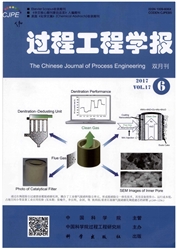

 中文摘要:
中文摘要:
利用摇瓶实验对纯Fe2(SO4)3溶液浸出高砷金精矿进行了研究,考察了温度及Fe3+浓度的影响,并与细菌直接浸矿进行了对比.同时,在Fe2(SO4)3溶液中加入高密度嗜中温氧化亚铁硫杆菌、嗜中温氧化硫硫杆菌、中度嗜热西伯利亚硫杆菌,考察其对Fe2(SO4)3溶液的辅助浸出作用.结果表明,Fe3+溶液化学浸出可迅速溶解高砷金精矿,随温度升高,浸出率先升后降,80℃时达最大;浸出前期Fe3+浓度的积累对浸出速率影响不大,初始Fe3+浓度越高As的浸出率越高,但当Fe3+浓度高于40g/L,由于沉淀严重,浸出率降低;连续浸出情况下,Fe3+浓度可维持恒定,10g/L的Fe3+可保持较快的矿物浸出速率.对照实验表明,较高的矿浆浓度对浸矿菌生长繁殖有显著影响.高密度浸矿菌可维持Fe2(SO4)3溶液中较高的Fe3+浓度并及时消除反应产生的S层的阻碍,有利于Fe2(SO4)3溶液对矿物的浸出.
 英文摘要:
英文摘要:
Fe3+ solution leaching of an arsenic-rich gold concentrate has been studied by shake-flask tests.The effects of temperature,concentration of Fe3+ and high density of bacteria(separately Acidithiobacillus ferrooxidans,Acidithiobacillus thiooxidans,Sulfobacillus sibiricu) have been investigated.Compared with bioleaching,Fe3+ solution chemical leaching leads to a higher dissolving rate of arsenic-rich gold concentrate.Higher temperature is favorable for the leaching,and the leaching rate of As is improved with increasing of temperature before reaching at 80.Fe3+ concentration has little effect on the leaching rate of As at the beginning of leaching,high Fe3+ concentration leads to high leaching rate of As when the concentration is lower than 40 g/L,but the leaching rate of As decreases when higher Fe3+ concentration is used due to the production of jarosite.In continuous operation,a higher leaching rate can be achieved under lower but constant Fe3+ concentration.In comparison with bioleaching experiments,increasing pulp density has an obviously negative effect on the bacteria,while the high density of bacteria can be helpful to relieve the effect,at the same time be better for Fe3+ solution chemical leaching for they can keep higher density of Fe3+ and lower S.
 同期刊论文项目
同期刊论文项目
 同项目期刊论文
同项目期刊论文
 期刊信息
期刊信息
